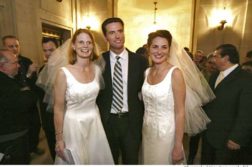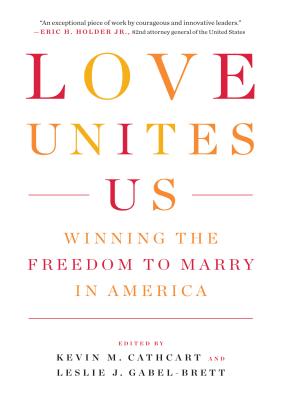Adapted from an op-ed that appeared in The Boston Globe (2/8/04).
When the Pilgrims landed at Plymouth in 1620, among the first things they did for the well-ordering of their new commonwealth was to institute the Dutch custom of civil marriage with which they had become familiar during their long sojourn in the Netherlands. The Dutch made civil marriage the law of the land in 1590, and the first marriage in New England, that of Edward Winslow to the widow Susannah White, was performed on May 12, 1621, in Plymouth by Governor William Bradford, in exercise of his office as magistrate.
There would be no clergyman in Plymouth until the arrival of the Rev. Ralph Smith in 1629, but even then marriage would continue to be a civil affair, as these first Puritans opposed the English custom of clerical marriage as unscriptural. Not until 1692, when Plymouth Colony was merged into that of Massachusetts Bay, were the clergy authorized by the new province to solemnize marriages. To this day in the Commonwealth the clergy, including those of the archdiocese, solemnize marriage legally as agents of the Commonwealth and by its civil authority. Chapter 207 of the General Laws of Massachusetts tells who may perform such ceremonies.
Thus, while the legitimate interests of religious communities in what some of them regard as the sacrament of marriage are worthy of consideration, those interests must not be confused either with the civil law of the Commonwealth or the civil rights of the citizens under its constitution. No clergy of any denomination are required to wed anyone of whose union they do not approve: There is no civil right to be married in church or with its blessing. The civil law is just that, and the distinction between it and ecclesiastical law is as important as the necessary distinction between church and state. Surely, after two years of protracted debate between church law and civil law in the child-abuse scandals we should appreciate the necessity of these distinctions.
It is to the civil rights of the citizens of Massachusetts that the Supreme Judicial Court responded in the Goodridge case, and this was no attack on the church, nor on religion. It was recognition that the social custom restricting marriage to heterosexuals, a custom long sanctioned by church and society, was no longer to be regarded as consistent with the rights of citizens under the constitution.
We have seen this before. When the courts eventually invalidated long-established laws sanctioned by church and society that forbade interracial marriage, the so-called “miscegenation” laws that obtained in many parts of this country within living memory, the courts that did this were invariably maligned as interventionist, arbitrary, and usurpatious. Most now would agree that those laws were wrong, indeed unconstitutional, and that the courts were right in their judgments on behalf of the petitioners.
“Judicial tyranny” is a phrase usually heard from those whose prejudices have not been sustained by a court’s decision. Happily, the fundamental rights of citizens in this republic are in the long run defended against another form of tyranny even more dangerous, the tyranny of the majority. Legislatures more often than not are subject to the prevailing passions of any majority that can muster sufficient votes; rarely are legislatures in the first instance instruments of social change. It was, after all, legislators who, reflecting the views of those who elected them, kept in place every oppressive law on the books until challenged by aggrieved citizens who sought relief in the courts.
If society waited for majority opinion and legislative action, African-Americans, for example, would still be enduring the indignities of separate but equal accommodation and the other manifestations of legal, social, and political segregation. If the decision of the Supreme Judicial Court in Goodridge is “judicial tyranny,” let there be more of it.
William Sloane Coffin, former Yale chaplain, civil rights and antiwar activist, in his most recent book defines hell as “truth seen too late.” History indicts those who in time of trouble and transition choose the past over the future. There are always conscientious people of deeply held religious conviction who, alas, on the basis of those convictions find themselves on the wrong side of history, such as those who hanged witches in the 17th century and embraced the fugitive slave laws in the 19th century; and those who, in our own time, find the support of custom, reason, and faith in their prejudices against Roman Catholics, Jews, and persons of other colors and ethnicities.
This resistance to extending not special rights but civil rights to homosexuals in marriage is but the most recent instance of this dubious legacy, and is not made any more palatable or respectable today by the support given to it by visible and highly placed clergy across denominational lines, from whom we have a right to expect better. The way to the future is always paved by extending, not restricting, liberties, especially to those who heretofore have been excluded. The health of a republic may well be determined by its capacity to adapt itself to the extension of its own privileges and responsibilities to those whom it would be easy by custom and conviction to ignore.
John Adams’s Massachusetts Constitution, the oldest such document in the world, laid down the rational basis for a civil body politic whose capacious hospitality has successively embraced people and views not contemplated by the founders. The Great and General Court ought not to betray the fundamental principles of the Commonwealth’s constitution by promulgating amendments that will, for the first time in our history, restrict rather than extend the rights and liberties of all of our citizens. To do so will do nothing to restore the difficult circumstances of modern marriage.
Divorce will not be halted, abuse will not be eliminated, frivolous heterosexual liaisons such as the recent publicity stunt of Britney Spears will still be lawful, and annulments will still be sought and obtained in the church courts. Nothing will be done to save marriage, and yet in the name of doing so, incalculable, retrogressive, and even punitive damage will be done to those of our fellow citizens who under the civil law crave the legitimization of their loving relationships.
Peter J. Gomes is the Plummer Professor of Christian Morals and Pusey Minister in the Memorial Church at Harvard University.




